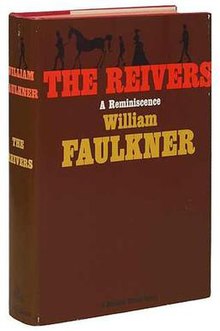
William Cuthbert Faulkner was an American writer known for his novels and short stories set in the fictional Yoknapatawpha County, based on Lafayette County, Mississippi, where Faulkner spent most of his life. A Nobel laureate, Faulkner is one of the most celebrated writers of American literature and often is considered the greatest writer of Southern literature.

Light in August is a 1932 novel by the Southern American author William Faulkner. It belongs to the Southern gothic and modernist literary genres.

The Sound and the Fury is a novel by the American author William Faulkner. It employs several narrative styles, including stream of consciousness. Published in 1929, The Sound and the Fury was Faulkner's fourth novel, and was not immediately successful. In 1931, however, when Faulkner's sixth novel, Sanctuary, was published—a sensationalist story, which Faulkner later said was written only for money—The Sound and the Fury also became commercially successful, and Faulkner began to receive critical attention.
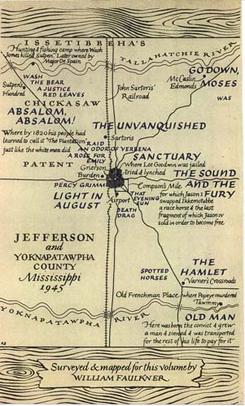
Yoknapatawpha County is a fictional Mississippi county created by the American author William Faulkner, largely based on and inspired by Lafayette County, Mississippi, and its county seat of Oxford. Faulkner often referred to Yoknapatawpha County as "my apocryphal county".
Louis Grenier is a fictional character in William Faulkner's novels and stories.
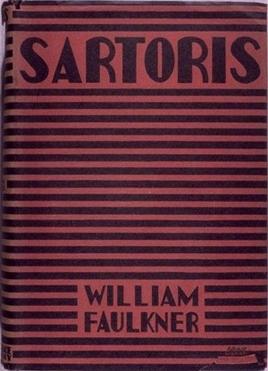
Sartoris is a novel, first published in 1929, by the American author William Faulkner. It portrays the decay of the Mississippi aristocracy following the social upheaval of the American Civil War. The 1929 edition is an abridged version of Faulkner's original work. The full text was published in 1973 as Flags in the Dust. Faulkner's great-grandfather William Clark Falkner, himself a colonel in the American Civil War, served as the model for Colonel John Sartoris. Faulkner also fashioned other characters in the book on local people from his hometown Oxford. His friend Ben Wasson was the model for Horace Benbow, while Faulkner's brother Murry served as the antetype for young Bayard Sartoris.
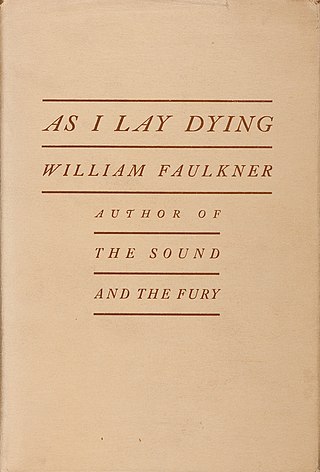
As I Lay Dying is a 1930 Southern Gothic novel by American author William Faulkner. Faulkner's fifth novel, it is consistently ranked among the best novels of the 20th century. The title is derived from William Marris's 1925 translation of Homer's Odyssey, referring to the similar themes of both works.
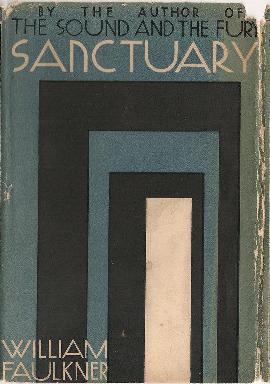
Sanctuary is a 1931 novel by American author William Faulkner about the rape and abduction of an upper-class Mississippi college girl, Temple Drake, during the Prohibition era. The novel was Faulkner's commercial and critical breakthrough and established his literary reputation, but was controversial given its themes. It is said Faulkner claimed it was a "potboiler", written purely for profit, but this has been debated by scholars and Faulkner's own friends.
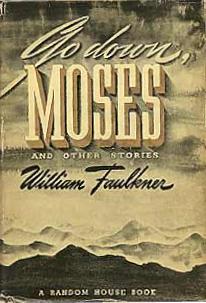
Go Down, Moses is a 1942 collection of seven related pieces of short fiction by American author William Faulkner, sometimes considered a novel. The most prominent character and unifying voice is that of Isaac McCaslin, "Uncle Ike", who will live to be an old man; "uncle to half a county and father to no one". Though originally published as a short story collection, Faulkner considered the book to be a novel in the same way The Unvanquished is considered a novel. Because of this, most editions no longer print "and other stories" in the title.

Rupert Crosse was an American television and film actor noted as the first African American to receive a nomination for a Best Supporting Actor Academy Award — for his role in the 1969 adaptation of William Faulkner's The Reivers.

The Hamlet is a novel by the American author William Faulkner, published in 1940, about the fictional Snopes family of Mississippi. Originally a standalone novel, it was later followed by The Town (1957) and The Mansion (1959), forming the Snopes trilogy.

The Mansion is a novel by the American author William Faulkner, published in 1959. It is the last in a trilogy of books about the fictional Snopes family of Mississippi, following The Hamlet and The Town.

The Unvanquished is a 1938 novel by the American author William Faulkner, set in the fictional Yoknapatawpha County. It tells the story of the Sartoris family, who first appeared in the novel Sartoris. The Unvanquished takes place before that story, and is set during the American Civil War. Principal characters are Bayard Sartoris, John Sartoris, Granny, Ringo (Morengo), Ab Snopes, Cousin Drusilla, Aunt Jenny, Louvinia, and the lieutenant.
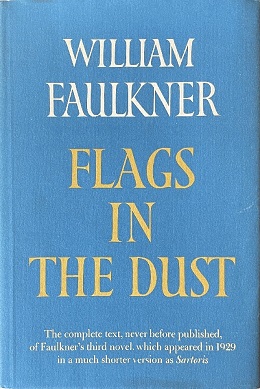
Flags in the Dust is a novel by the American author William Faulkner, completed in 1927. His publisher heavily edited the manuscript with Faulkner's reluctant consent, removing about 40,000 words in the process. That version was published as Sartoris in 1929. Faulkner's original manuscript of Flags in the Dust was published in 1973, and Sartoris was subsequently taken out of print.

Moonrunners is a 1975 action comedy film starring James Mitchum, about a Southern family who runs bootleg liquor. It was reworked four years later into the popular long-running television series The Dukes of Hazzard, and the two productions share some similarities. Mitchum had co-starred with his father, Robert Mitchum, in the similar drive-in favorite Thunder Road 18 years earlier, which also focused upon moonshine-running bootleggers using fast cars to elude federal agents. Moonrunners, a B movie, was filmed in 1973 and awaited release for over a year. Its soundtrack reflects the outlaw music boom of the 1970s during which the film was released.
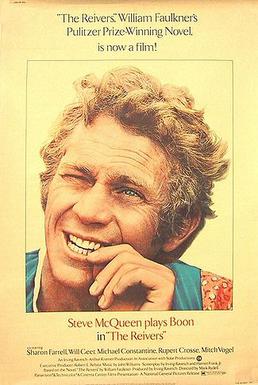
The Reivers is a 1969 Technicolor film in Panavision starring Steve McQueen and directed by Mark Rydell, based on the 1962 William Faulkner novel The Reivers, a Reminiscence. The supporting cast includes Sharon Farrell, Rupert Crosse, Mitch Vogel and Burgess Meredith as the narrator.
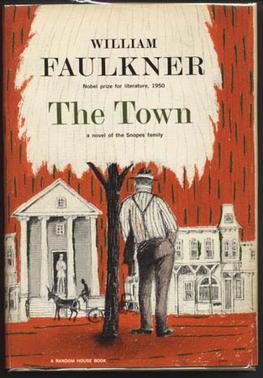
The Town is a novel by the American author William Faulkner, published in 1957, about the fictional Snopes family of Mississippi. It is the second of the "Snopes" trilogy, following The Hamlet (1940) and completed by The Mansion (1959).
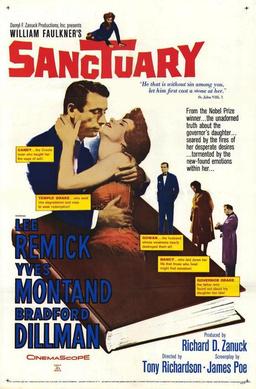
Sanctuary is a 1961 drama film directed by Tony Richardson. The film, based on the William Faulkner novels Sanctuary (1931) and Requiem for a Nun (1951), is about the black maid of a white woman who kills the latter's newborn in order to give her employer a way out of a predicament, and then faces the death penalty.

William Faulkner (1897—1962) was an American writer who won the 1949 Nobel Prize in Literature. He is best known for his novels and short stories set in the fictional Yoknapatawpha County, a stand-in for his hometown of Oxford in Lafayette County, Mississippi.
Gavin Stevens is a lawyer and the county attorney in Jefferson in Faulkner's fictional Yoknapatawpha County, Mississippi. He was educated at Harvard and Heidelberg universities.
